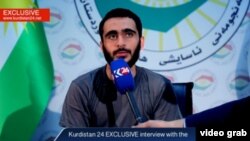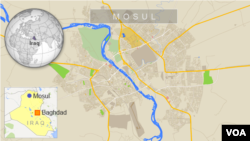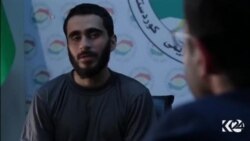ຄົນອາເມຣິກັນຜູ້ນຶ່ງທີ່ກ່າວວ່າ ລາວໄດ້ໂຕນໜີຈາກກຸ່ມລັດອິສ
ລາມຍອມຮັບວ່າລາວໄດ້ຄິດຜິດເວລາລາວຕັດສິນໃຈໄປຮ່ວມ
ກັບກຸ່ມຫົວຮຸນແຮງດັ່ງກ່າວໃນພາກຕາເວັນອອກກາງ.
ທ້າວ Mohamad Jamal Khweis ກ່າວໃນການໃຫ້ສຳພາດ
ຢູ່ທີ່ເຂດ Kurdistan ຂອງອີຣັກວ່າລາວໄດ້ຕັດສິນໃຈຜິດທີ່ໄດ້
ເດີນທາງໄປເມືອງ Mosul ກັບແມ່ຍິງຄົນນຶ່ງລາວໄດ້ຄິດຜິດໄປ
ແລ້ວ.
ທ້າວ Khweis ອາຍຸ 26 ປີ ໄດ້ເຂົ້າມອບຕົວຕໍ່ພວກນັກລົບ Pe-
shmerga ຂອງຊາວເຄີດ ໃກ້ກັບເມືອງ Sinja ໃນພາກເໜືອອີ
ຣັກ ໃນອາທິດນີ້ ແລະຜູ້ກ່ຽວໄດ້ຖືກກຳລັງຊາວເຄີດຄວບຄຸມຕົວໄວ້ຕັ້ງແຕ່ວັນຈັນແລ້ວນີ້
ເປັນຕົ້ນມາ.
ທ້າວ Khweis ເກີດຢູ່ທີ່ສະຫະລັດແລະເຕີບໃຫຍ່ຂຶ້ນມາໃນເຂດຊານເມືອງຂອງນະຄອນ
ຫຼວງວໍຊິງຕັນ ໄດ້ຖືກສຳພາດໂດຍໂທລະພາບຊ່ອງ 24 ຂອງຊາວເຄີດຢູ່ທີ່ເມືອງ Irbil ໃນ
ພາກເໜືອຂອງປະເທດອີຣັກ.
ທ້າວ Khweis ໄດ້ເວົ້າພາສາອັງກິດ ໃນລະຫວ່າງການໃຫ້ສຳພາດ ຊຶ່ງໄດ້ຖືກຕັດລົງ ໃຫ້ເຫລືອຢູ່ 16 ນາທີ ທີ່ບໍ່ໄດ້ກ່າວເຖິງການສູ້ລົບ ຫຼືຄວາມຮຸນແຮງໃດໆ ແຕ່ໄດ້ເປີດເຜີີຍໃຫ້
ຮູຸ້ກ່ຽວກັບພື້ນຖານ ຂອງຊາຍໜຸ່ມຄົນນີ້ ແລະການເດີນທາງຂອງຜູ້ກ່ຽວ ທີ່ໄດ້ເລີ້ມມາແຕ່
ເດືອນທັນວາ ເວລາລາວອອກເດີນທາງ ໄປຮ່ວມກຸ່ມຫົວຮຸນແຮງຈັດດັງກ່າວ.
ການໃຫ້ສຳພາດສະແດງໃຫ້ເຫັນວ່າ ໜຸ່ມນ້ອຍທີ່ມີໜວດເຄົາໃນຊຸດສົ້ງສີກາກີແລະເສື້ອ
ແຂນສັ້ນ ຄໍມົນ ສີຂີ້ເທົ່າອອກຟ້າ ຄົນນີ້ ໄດ້ເວົ້າຈາໂອ້ລົມແບບງຽບໆ ແລະບາງຄັ້ງກໍຍິ້ມ
ຫົວ.
ການໃຫ້ສຳພາດສະແດງໃຫ້ເຫັນວ່າ ໜຸ່ມນ້ອຍທີ່ມີໜວດເຄົາໃນຊຸດສົ້ງສີກາກີແລະເສື້ອ
ແຂນສັ້ນ ຄໍມົນ ສີຂີ້ເທົ່າອອກຟ້າ ຄົນນີ້ ໄດ້ເວົ້າຈາໂອ້ລົມແບບງຽບໆ ແລະບາງຄັ້ງກໍຍິ້ມ
ຫົວ.
ທ້າວ Khweis ກ່າວວ່າ ລາວຮຽນກ່ຽວກັບຂະບວນການຍຸຕິທຳທາງອາຍາຢູ່ທີ່ມະຫາວິທະ
ຍາໄລ ແຕ່ບໍ່ໄດ້ບອກໃຫ້ຮູ້ວ່າຢູ່ໃສ. ພໍ່ແມ່ຂອງລາວທີ່ເປັນຊາວປາແລສໄຕນ໌ໄດ້ທຳມາຫາ
ກິນຢູ່ທີ່ເມືອງ Alexandria ໃນລັດເວີຈີເນຍ. ໜຸ່ມນ້ອຍຄົນນີ້ ຍັງໄດ້ໄປວັດອິສລາມ ແຕ່ບໍ່
ແມ່ນເລື້ອຍໆ ແລະໃນການໃຫ້ສຳພາດນັ້ນ ບໍ່ໄດ້ສະແດງໃຫ້ເຫັນວ່າ ແມ່ນຫຍັງໄດ້ດົນໃຈ
ໃຫ້ຜູ້ກ່ຽວອອກເດີນທາງໄປຮ່ວມກຸ່ມຫົວຮຸນແຮງຈັດດັ່ງກ່າວ.
An American who said he defected from the Islamic State group has admitted he "wasn't thinking straight" when he decided to join the militant group in the Middle East this year.
"I made a bad decision to go with [a] girl and go to Mosul. ... I wasn't thinking straight," Mohamad Jamal Khweis told an interviewer in Iraqi Kurdistan.
The 26-year-old surrendered to Kurdish peshmerga fighters near the northern Iraqi city of Sinjar this week, and has been held by them since Monday.
Khweis, who was born in the U.S. and grew up in a suburb of Washington, was interviewed by Kurdistan24 television in Irbil, a Kurdish city in northern Iraq. [[http://www.kurdistan24.net/en/news/bf92b765-a474-4f3b-8dcd-d90446a60f9c/EXCLUSIVE-interview-with-the-American-born-ISIS-fighter ]]
Khweis spoke English during the interview, which was edited down to a 16-minute version. It contains no mention of fighting or other violence, though it reveals some of the man's background and his travels since December, when he set oput to join the extremist group.
The interview shows a bearded young man in khaki pants and a short-sleeved, collarless gray-blue shirt, speaking calmly and occasionally smiling.
Khweis said he studied criminal justice while in college, though he did not say where. His parents, who are Palestinians, live in Alexandria, Virginia. The young man also attended mosques, "but not that often," he said, and the interview does not indicate what motivated him to set out to join the Islamic State.
In an interview with VOA earlier this week, a woman identified as Khweis's mother said the family "thought he was in Canada lately. We also know he has been traveling to Turkey."
After leaving the United States in mid-December, the alleged IS defector said he traveled from London to Amsterdam to Turkey, where he met an Iraqi woman and "we spent some time together."
The woman, whose sister was married to an IS fighter, arranged a trip for herself and Khweis by bus and taxi from Istanbul to Syria and then to Iraq, where they were separated.
Khweis said he lived in Iraq in a series of residences, most of which sheltered foreigners. In one, there were "a lot of Asians, Russians and people from the surrounding area, like Uzbekistan." He also mentioned Middle Eastern residents.
However, he noted, "During my whole trip there, I didn't meet any Americans."
Eventually, Khweis and other recruits began religious studies at "a house of worship" in the IS stronghold of Mosul. He said "a few Russians were in charge," but he may have been referring to IS recruits from Russia's republic of Chechnya, which has sent many recruits to join the Islamic State.
"There was an imam who taught us about sharia [law]," Khweis said. "Our daily life was basically prayer, eating and learning about the religion for about eight hours."
Khweis said he did not complete the full training program and "didn't agree with their ideology." He told his interviewer, "That's when I wanted to escape."
"It was pretty hard to live in Mosul. It's not like Western countries. It's very strict. There's no smoking," Khweis said during the interview, which also showed him puffing on a cigarette. "The lifestyle in Mosul was very difficultnot just for me, for everybody there. ... I stayed there for about a month."
"After things didn't work out," the young man said, "I didn't see myselfliving in that environment. I wanted to go back to America."
A friend helped arrange his travel from IS-held territory toward an area defended by Kurdish peshmerga fighters, and other contacts advised him how to reach the main road to the Iraqi town of Sinjar, under Kurdish control since November, in an area that has seen fighting between peshmerga and IS fighters since 2014.
"They told me which side [of the road] is Daesh side and which side is peshmerga, the Kurd side," Khweis said. "I wanted to go to the Kurd side because I know that they're good with the Americans."
After he surrendered. the Kurds "treated me very well, and I'm happy I made that decision."
In the video, Khweis denounced the Islamic State and summed up his experiences in Mosul: "My message to the American people is, the life in Mosul, it's really bad. The people [who] were controlling Mosul don't represent the religion. ... I don't see them as good Muslims."







